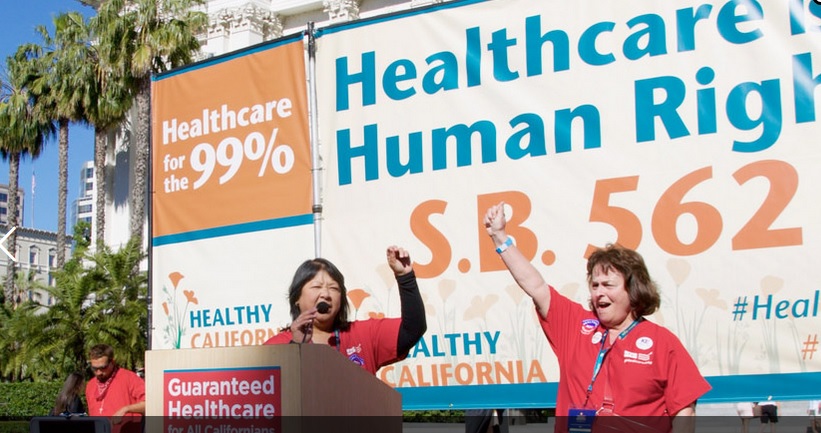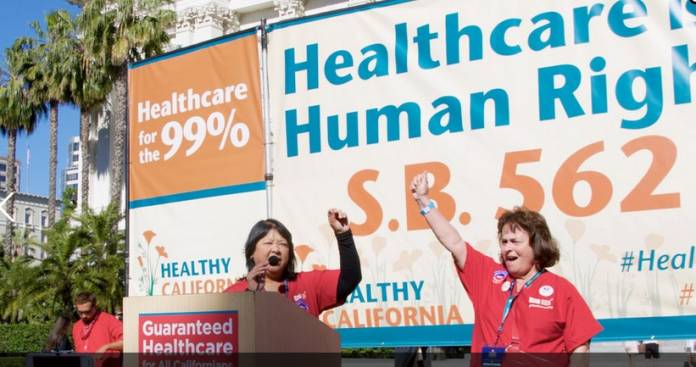The headlines were so consistent, so predictably bad, that I almost couldn’t read them. “Single-payer will cost $400 billion.” “Single-payer costs dwarf entire state budget.”
Even when the state Senate approved the measure, here’s what the Bay Area News Group had to say:
SACRAMENTO — As a legislative deadline loomed, California senators Thursday — in some cases, reluctantly — voted to pass a $400 billion plan to create a government-run health care system without a way to pay for it.
As the single-payer bill heads to the state Assembly, this is exactly the media message that the private insurance and pharma industry wants. And it’s utterly, completely, embarrassingly inaccurate.

Here’s the reality that gets lost in the headlines:
California already spends $368 billion a year on health care, and that’s with 2.5 million uninsured people and about 12 million who have such limited insurance that they can’t always get the care they need.
In ten years, studies show, that price ticket will be $587 billion – half a trillion bucks, 20 percent of the state’s entire economy.
So private insurance already costs pretty close to $400 billion – and it’s failing and unsustainable.
With single-payer, the cost would drop to $331 billion — meaning the people and businesses in California would pay $37 billion less than they are paying now for health care, a new study shows.
That money we pay now for a dysfunctional system comes from the same place the state budget comes from – federal reimbursements and individuals and businesses who pay taxes. There’s no difference between money that I pay every month out of my pocket for health insurance and money that I could pay every month in taxes to the state so that everyone has health insurance – except for the fact that if I paid the money to the state, it would cost me a lot less.
In fact, a study by one of the most eminent economists in the country shows, nearly everyone in California would pay substantially less every year for health care if we went to a single-payer system.
Again, in simple language for my colleagues who can’t seem to understand this: That big-ticket dollar sign the insurance industry is putting out, that number way bigger than the state budget? We are already paying that. And we aren’t getting our money’s worth.
What single-payer would do is eliminate the middle-man. Instead of writing a big check to the insurance industry every month, businesses and individuals would write a smaller check to the state of California. Instead of dealing with a profit-seeking industry that goes out of its way to deny claims for care, your doctor would get paid by the state.
Oh, and all those government agencies that use taxpayer money to employ workers and pay their health care? They wouldn’t be paying massive bills to private companies for health care anymore. That means the workers could take home more money and the taxpayers would be on the hook for less.
This is how it works in most of the developed world, where costs are far lower and results far better than we see in the United States.
Is there anything about this that is even a bit confusing?
If you want to read a fascinating 85-page economic study that looks at how this would work, it’s right here. The principal author is Robert Pollin, distinguished professor of economics at UMass Amherst.
Yeah, you can get economists to argue about anything, but there is basic data here, and it reveals some basic truths.
The first is that the $400 billion figure is based on the existing system. Covering all of the uninsured and underinsured people would, indeed, increase overall spending by 9.1 percent, from $368 billion to $404.1 billion — if we just kept doing what we do now.
But if we got rid of the private insurance industry, the costs of delivering care would drop radically.
In fact, the total cost of providing care to everyone – which is a lot more than we do now – would drop to $331 billion. That means the people of the state of California would save $37 billion, more than ten percent, immediately, by implementing single-payer.
Where would that $331 billion come from? Most of it would come from the existing money that the federal government spends underwriting Medicare and Medi-Cal.
The rest, Pollin and his team suggest, would come from a modest increase in taxes on businesses and individuals. I like their gross receipts tax (which would exempt smaller businesses) and I’d prefer an income-tax increase, but either way, most Californians will do a lot better – and nobody will be worse off.
(Well, that’s not quite true. The insurance companies that are making a ton of money in this state will be worse off. Their chief executives, who make multiples of millions of dollars, might be worse off. There will be a period of transition when private companies shut down their state operations and the state expands its operations, but this is a case where skills are immediately transferable – most of the front-line workers in the insurance industry will be qualified for jobs with the state.
(The difference is that those workers will not be trained to deny claims. The last time data was available, the California Nurses Association found that the seven largest private insurers in the state denied 26 percent of all the claims that were put in by people who paid them money for health insurance.)
The typical middle-income California family spends between 3.4 and 9.9 percent of its income on health insurance. That would drop to 0.8 percent under single-payer – including the increase in sales taxes. A family with an income of $62,300 would wind up with $5,404 more in spending money, even after paying the higher sales taxes, the study shows.
Families with income of more than $340,000 would wind up about paying a tiny bit more, mostly because wealthy families that pay their own health insurance get a substantial tax break because they can write those expenses off their federal and state income taxes.
Small businesses would be the biggest beneficiaries: A company with nine employees and $811,000 in gross receipts that pays for employee health care would save $24,000 a year. A medium-sized business with 38 employees and $10 million in gross receipts would save $131,000.
Workers who have employer-paid health insurance would no longer have to pay their share of that (very few companies pay 100 percent). And unionized workers could argue for higher pay because a significant part of any contract includes the cost of health insurance.
Chuck Idelson, a spokesperson for the California Nurses Association, which is backing the single-payer bill, told me that the media coverage has been a problem. “Once a media narrative gets spun, anyone who tries to counter it is considered an outsider. That’s what we’re faced with, since so much of this is counter to the reality.”
The reality, he said, is that the current system is completely unsustainable. Hard to argue with that.






